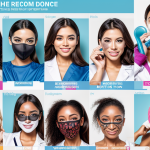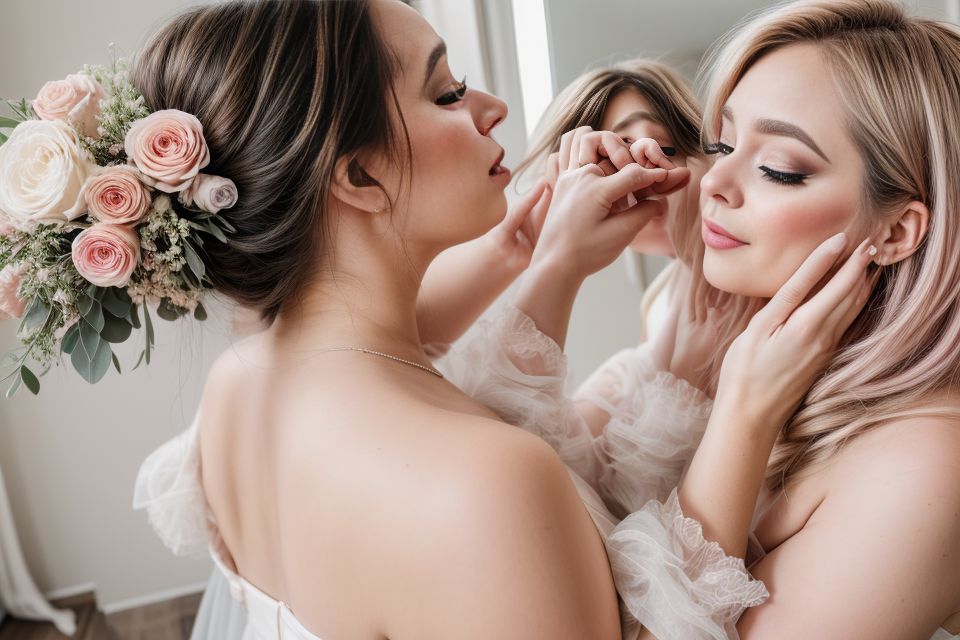In any relationship, conflicts and disagreements are inevitable. These misunderstandings can put a strain on the bond between two people, causing tension and stress. This is where the concept of “make up” comes into play. But what does it truly mean to “make up” in a relationship? Is it just about saying sorry and moving on, or is there more to it than meets the eye? In this article, we will delve into the true meaning of makeup in a relationship and explore the various aspects that come with it. So, buckle up and get ready to uncover the truth behind this often misunderstood concept.
The true meaning of makeup in a relationship refers to the act of reconciling and forgiving one another after a conflict or argument. It involves both partners putting aside their differences and working towards a resolution, often through open communication and compromise. Makeup in a relationship is not just about applying cosmetics to cover up physical imperfections, but rather it is about covering up the emotional hurts and misunderstandings that may have arisen between two people who care for each other. Ultimately, makeup in a relationship is about showing love, understanding, and a willingness to move forward together, despite any challenges that may arise.
Understanding the concept of makeup in relationships
Definition of makeup in relationships
In the context of romantic relationships, makeup refers to the process of forgiving and forgetting past conflicts or offenses, and working towards reconciliation and restoration of the relationship. This process involves both partners expressing remorse, making amends, and committing to change for the betterment of the relationship.
While makeup is often associated with apologies and forgiveness, it is not simply about one partner “winning” an argument or forcing the other to concede. Instead, it is about finding a mutually acceptable resolution and moving forward in a positive direction.
Makeup can take different forms, such as a heartfelt conversation, a written apology, or a thoughtful gesture to show remorse. The goal is to create a sense of closure and healing, and to strengthen the bond between partners.
It is important to note that makeup is not always easy or immediate, and it may require time, effort, and patience from both partners. However, when approached with a genuine desire to improve the relationship, makeup can be a powerful tool for rebuilding trust, respect, and intimacy.
Importance of makeup in relationships
In the context of a relationship, makeup refers to the process of repairing and restoring harmony and connection between two individuals who have experienced a conflict or disagreement. Makeup is often seen as a critical component of maintaining healthy relationships, as it allows partners to address and resolve issues, strengthen their bond, and move forward together.
One of the key benefits of makeup in relationships is that it enables partners to express their feelings and needs in a safe and supportive environment. When couples engage in constructive conversations during makeup sessions, they are more likely to understand each other’s perspectives and find solutions that work for both parties. This can help to reduce misunderstandings and miscommunications, which can be detrimental to the relationship over time.
Additionally, makeup can help partners to reconnect emotionally and physically, which is essential for maintaining intimacy and a sense of closeness. When conflicts arise, it is common for partners to feel emotionally distant from one another, but makeup can help to bridge this gap by fostering empathy, compassion, and trust. By taking the time to address and resolve issues, partners can strengthen their emotional bond and build a stronger foundation for their relationship.
Another important aspect of makeup in relationships is that it can help partners to develop better communication skills and conflict resolution strategies. By learning how to effectively express their needs and desires, as well as how to listen and respond to their partner’s concerns, couples can improve their overall communication and reduce the likelihood of future conflicts. This can ultimately lead to a more harmonious and fulfilling relationship over the long term.
Overall, the importance of makeup in relationships cannot be overstated. By taking the time to address and resolve conflicts, partners can strengthen their bond, build trust and intimacy, and develop better communication skills that will serve them well throughout their relationship.
Common misconceptions about makeup in relationships
In any relationship, the term “makeup” often conjures up the idea of putting on cosmetics to enhance one’s appearance. However, when it comes to relationships, the term “makeup” has a deeper meaning that goes beyond physical appearance. It refers to the effort that both partners put into repairing and restoring the connection in their relationship after a fight or a disagreement.
One common misconception about makeup in relationships is that it is only necessary when things are going wrong. In reality, makeup is important in all relationships, whether they are going through a rough patch or not. This is because it helps to keep the connection strong and prevent small issues from becoming bigger problems.
Another misconception is that makeup is always easy and straightforward. In fact, it can be a challenging process that requires both partners to be willing to communicate openly and honestly with each other. It also requires both partners to be willing to listen and understand each other’s perspective.
Furthermore, some people may believe that makeup is only necessary when one partner is at fault. However, this is not the case. Makeup is necessary in any relationship, regardless of who is at fault. It is important to remember that everyone makes mistakes, and the goal of makeup is to move past those mistakes and restore the connection between partners.
Lastly, some people may think that makeup is a sign of weakness or that it means that they are not strong enough to handle conflict on their own. However, this is not true. Makeup is a sign of strength and maturity, as it requires both partners to be willing to work together to maintain a healthy and strong relationship.
In conclusion, the true meaning of makeup in a relationship goes beyond physical appearance and refers to the effort that both partners put into repairing and restoring the connection in their relationship. There are several common misconceptions about makeup in relationships, including the belief that it is only necessary when things are going wrong, that it is always easy and straightforward, that it is only necessary when one partner is at fault, and that it is a sign of weakness. Understanding the true meaning of makeup and dispelling these misconceptions can help to strengthen and maintain healthy relationships.
The role of communication in makeup
Makeup plays a crucial role in relationships, particularly in the context of conflict resolution. Effective communication is a vital component of makeup, and it is important to understand its significance in order to foster healthy relationships.
One of the key aspects of communication during makeup is active listening. This involves paying attention to the other person’s perspective and understanding their feelings and emotions. By actively listening, partners can gain a deeper understanding of each other’s needs and concerns, which can help to resolve conflicts and strengthen the relationship.
Another important aspect of communication during makeup is expressing oneself clearly and honestly. This involves using “I” statements to express one’s feelings and needs, rather than making accusations or attacking the other person. By communicating in this way, partners can avoid escalating conflicts and work towards finding a resolution that meets both of their needs.
Additionally, makeup is an opportunity for partners to show empathy and understanding towards each other. This involves acknowledging the other person’s feelings and offering support and validation. By demonstrating empathy, partners can build trust and strengthen their emotional connection, which is essential for a healthy relationship.
In summary, effective communication is a crucial component of makeup in relationships. By actively listening, expressing oneself clearly and honestly, and demonstrating empathy, partners can resolve conflicts, strengthen their emotional connection, and foster a healthy relationship.
Types of makeup in relationships
Emotional makeup
Emotional makeup refers to the act of concealing or suppressing one’s true emotions in a relationship. This type of makeup is often used as a coping mechanism to avoid conflict or confrontation, or to maintain a sense of control or stability in the relationship.
Reasons for emotional makeup
- Fear of rejection or abandonment
- Desire to maintain peace and harmony in the relationship
- Concerns about appearing vulnerable or weak
- Difficulty expressing emotions or communicating effectively
Consequences of emotional makeup
- Suppression of authentic emotions and needs
- Difficulty resolving conflicts or addressing issues in the relationship
- Potential for emotional repression or resentment
- Difficulty establishing healthy boundaries and expectations
Strategies for overcoming emotional makeup
- Improving communication skills and learning healthy conflict resolution techniques
- Identifying and addressing underlying fears or insecurities
- Practicing self-reflection and emotional expression
- Seeking support from trusted friends, family, or a therapist
Emotional makeup can be a challenging aspect of relationships to navigate, but it is important to recognize its impact on overall relationship satisfaction and well-being. By learning to express emotions authentically and effectively, individuals can build stronger, more fulfilling relationships based on trust, mutual respect, and open communication.
Physical makeup
Physical makeup refers to the external appearance of a person, which can be altered through the use of cosmetics. In the context of relationships, physical makeup can play a significant role in how individuals perceive each other.
Some common examples of physical makeup include:
- Wearing makeup to enhance one’s features and create a more polished appearance
- Using cosmetics to cover up blemishes or imperfections
- Changing one’s hairstyle or color to create a new look
In some cases, physical makeup can be used as a form of self-expression or to convey a certain mood or feeling. For example, someone might wear bright, bold makeup to a party to stand out and express their confidence.
However, it’s important to note that physical makeup is not always an accurate reflection of a person’s true appearance or personality. Some people may use heavy makeup to hide their true selves, while others may feel pressure to conform to societal beauty standards.
Ultimately, the true meaning of physical makeup in a relationship depends on the individual circumstances and the intentions of those involved. It’s important to remember that a person’s appearance is just one aspect of who they are, and it’s essential to get to know someone for who they truly are beneath the surface.
Verbal makeup
Verbal makeup refers to the act of resolving conflicts or disagreements through open and honest communication. It involves discussing problems and concerns with your partner in a calm and respectful manner, with the goal of finding a mutually satisfying solution. This type of makeup is important in any relationship, as it allows couples to address issues as they arise and prevent small problems from becoming bigger ones.
One key aspect of verbal makeup is active listening. This means that both partners must listen to each other without interrupting or becoming defensive, and must try to understand each other’s perspective. By actively listening to your partner, you can gain a better understanding of their needs and feelings, which can help you to find a solution that works for both of you.
Another important aspect of verbal makeup is being open and honest with your partner. This means being willing to share your thoughts and feelings, even if they are difficult or uncomfortable. By being open and honest, you can build trust and strengthen your relationship, as your partner will feel that they can rely on you to be honest and transparent.
Effective verbal makeup also involves compromise and flexibility. No two people are going to agree on everything, and it’s important to be willing to make concessions and find a middle ground that works for both partners. This can be difficult, but it’s an important part of building a strong and healthy relationship.
Overall, verbal makeup is a crucial aspect of any relationship. By communicating openly and honestly, actively listening, being open and honest, and being willing to compromise, couples can resolve conflicts and build a stronger, more resilient relationship.
The impact of makeup on relationships
Positive effects of makeup on relationships
In a relationship, makeup can have several positive effects that can strengthen the bond between two individuals. One of the most obvious benefits of makeup is that it can enhance a person’s physical appearance, making them look more attractive and confident. This boost in confidence can lead to increased self-esteem, which can positively impact the way a person interacts with their partner.
Moreover, makeup can be used as a form of self-expression, allowing individuals to showcase their unique style and personality. This can create a sense of individuality within a relationship, allowing both partners to express themselves and feel more connected to each other. Additionally, makeup can be used to create a shared experience between partners, such as trying new makeup looks together or sharing tips and tricks.
Another positive effect of makeup in a relationship is that it can serve as a form of intimacy. Whether it’s applying makeup together or taking the time to pamper oneself with a skincare routine, makeup can create a sense of closeness and connection between partners. It can also be used as a form of playful expression, such as trying out different looks or creating a shared theme for a night out.
Finally, makeup can also have a positive impact on mental health. For some individuals, applying makeup can be a form of self-care and can help to reduce stress and anxiety. In a relationship, this can create a sense of support and understanding between partners, as they can both prioritize their mental health and well-being.
Overall, makeup can have several positive effects on relationships, from enhancing physical appearance to creating shared experiences and promoting mental health. However, it’s important to remember that makeup should never be used as a tool for manipulation or control in a relationship. It should always be used in a way that is respectful and supportive of both partners.
Negative effects of makeup on relationships
Makeup can have a significant impact on relationships, and while it may seem harmless on the surface, there are several negative effects that should be considered.
Firstly, makeup can create unrealistic expectations and pressure on individuals to look a certain way. This can lead to feelings of inadequacy and low self-esteem, especially in those who do not naturally have the same features as their partners.
Furthermore, makeup can also create a barrier between partners, as it can be used to hide feelings or emotions. This can make it difficult for partners to communicate openly and honestly with each other, leading to misunderstandings and resentment.
Additionally, makeup can also be used as a form of manipulation, as some individuals may use it to control the actions or behavior of their partners. This can lead to a loss of individuality and independence, and can ultimately harm the relationship.
Finally, makeup can also create jealousy and insecurity within relationships, as partners may feel threatened by the attention and focus on appearance rather than the quality of the relationship itself.
In conclusion, while makeup may seem like a harmless aspect of a relationship, it can have several negative effects on individuals and their relationships. It is important to consider these effects and approach makeup in a healthy and balanced way in order to maintain a strong and healthy relationship.
How to maintain a healthy balance of makeup in relationships
- Recognize the importance of open communication
- Open communication is the key to any healthy relationship, and makeup is no exception. Couples must communicate openly and honestly about their feelings, expectations, and boundaries when it comes to makeup. This can help to avoid misunderstandings and conflicts that can arise when one partner is not on the same page as the other.
- Be mindful of individual differences
- Everyone has different preferences when it comes to makeup, and it’s important to respect these differences in a relationship. What one partner may see as a small gesture, the other may see as a major betrayal. Couples should take the time to understand each other’s perspectives and find a compromise that works for both of them.
- Establish clear boundaries
- It’s important to establish clear boundaries when it comes to makeup in a relationship. This can include discussing what is and is not acceptable, as well as setting limits on the amount of makeup that is used. Couples should also discuss the frequency and duration of makeup sessions, as well as any other expectations they may have.
- Practice self-care and self-expression
- Makeup can be a form of self-expression and self-care for some individuals. However, it’s important to remember that makeup should not be used as a substitute for self-care or as a way to control or manipulate one’s partner. Couples should encourage each other to practice self-care and self-expression in healthy ways, such as through exercise, hobbies, or spending time with friends.
- Seek professional help if needed
- If a couple is struggling to maintain a healthy balance of makeup in their relationship, it may be helpful to seek professional help. A therapist or counselor can help couples to communicate more effectively, understand each other’s perspectives, and find solutions that work for both of them.
By following these tips, couples can maintain a healthy balance of makeup in their relationship and ensure that makeup is used in a positive and constructive way.
Strategies for improving makeup in relationships
Active listening
Active listening is a crucial strategy for improving communication and empathy in a relationship. It involves paying full attention to the other person’s words, tone, and body language, without interrupting or forming counterarguments. This allows both partners to feel heard and understood, and it fosters trust and intimacy. To practice active listening, you can try the following:
- Give your full attention to your partner by making eye contact, nodding, and maintaining a comfortable silence.
- Avoid interrupting or finishing your partner’s sentences, as this can be disrespectful and prevent them from expressing themselves fully.
- Use reflective listening, which involves paraphrasing or summarizing what your partner has said, to show that you understand their perspective.
- Ask open-ended questions to encourage your partner to share more about their thoughts and feelings.
- Share your own thoughts and feelings in a non-judgmental way, which can help your partner feel more comfortable sharing their own emotions.
By practicing active listening, you can improve your communication skills and deepen your understanding of your partner’s needs and desires. This can lead to more meaningful conversations and a stronger, more fulfilling relationship.
Honesty and transparency
Makeup plays a crucial role in the dynamics of a relationship. While it can bring people closer together, it can also create tension and misunderstandings. To improve makeup in a relationship, it is essential to cultivate honesty and transparency. This means being open and honest with your partner about your thoughts, feelings, and intentions. By fostering a culture of open communication, you can build trust and understanding, which can strengthen your relationship over time.
Here are some specific ways that honesty and transparency can improve makeup in a relationship:
Admitting mistakes
One of the most important aspects of honesty and transparency in a relationship is admitting mistakes. When you make a mistake, it is essential to own up to it and apologize to your partner. This shows that you are taking responsibility for your actions and are committed to making things right. It also demonstrates humility and a willingness to grow and learn from your mistakes.
Being open about your feelings
Another way that honesty and transparency can improve makeup in a relationship is by being open about your feelings. This means sharing your thoughts and emotions with your partner, even if they are difficult or uncomfortable. By being open and honest about your feelings, you can avoid misunderstandings and prevent your partner from feeling like they are guessing about what you are thinking or feeling.
Communicating your needs
In addition to being open about your feelings, it is also important to communicate your needs in a relationship. This means letting your partner know what you need from them in terms of support, attention, and affection. By communicating your needs clearly, you can avoid misunderstandings and prevent your partner from feeling like they are failing to meet your expectations.
Being transparent about your past
Finally, honesty and transparency in a relationship also means being open about your past. This means sharing your history, including any past relationships, experiences, and challenges that may have shaped who you are today. By being transparent about your past, you can build trust and understanding with your partner, and avoid any surprises or misunderstandings down the road.
In conclusion, honesty and transparency are essential strategies for improving makeup in a relationship. By being open and honest with your partner about your thoughts, feelings, and intentions, you can build trust and understanding, which can strengthen your relationship over time. Whether it’s admitting mistakes, being open about your feelings, communicating your needs, or being transparent about your past, honesty and transparency are key to improving makeup in any relationship.
Seeking professional help
In some cases, seeking professional help may be necessary to improve makeup in a relationship. A trained therapist or counselor can provide a neutral third-party perspective and help both partners communicate more effectively.
One effective approach is cognitive-behavioral therapy (CBT), which focuses on identifying and changing negative thought patterns and behaviors that contribute to conflicts in the relationship. This approach can help partners develop healthier communication habits and learn how to resolve conflicts in a more productive manner.
Another approach is emotion-focused therapy (EFT), which focuses on understanding and managing emotions that arise during conflicts. This approach can help partners identify and express their emotions in a healthy way, and learn how to support each other during difficult times.
In some cases, couples therapy may be recommended, which involves both partners working with a therapist to address relationship issues. This approach can be particularly helpful for couples who are experiencing significant conflict or distress in their relationship.
It’s important to note that seeking professional help is not always necessary, and many couples are able to improve their makeup through self-reflection and communication practice. However, if makeup is causing significant distress or negatively impacting the quality of life for either partner, seeking professional help may be a helpful option.
Practicing self-care
When it comes to improving makeup in a relationship, one effective strategy is to practice self-care. Self-care involves taking care of your physical, emotional, and mental well-being, which can have a positive impact on your relationship. Here are some ways to practice self-care:
- Get enough rest: It’s important to get enough sleep to feel rested and energized. Aim for at least 7-8 hours of sleep each night and establish a consistent sleep schedule.
- Eat a healthy diet: Eating a balanced diet that includes plenty of fruits, vegetables, whole grains, and lean protein can help you feel physically and mentally stronger.
- Exercise regularly: Exercise is a great way to reduce stress, improve mood, and boost energy levels. Aim for at least 30 minutes of moderate exercise most days of the week.
- Set boundaries: It’s important to set boundaries in your relationship to maintain your own sense of identity and independence. This can involve setting aside time for yourself, having your own hobbies and interests, and communicating your needs and limits to your partner.
- Seek support: If you’re struggling with relationship issues or other challenges, it’s important to seek support from friends, family, or a mental health professional. This can help you feel more resilient and better equipped to handle difficult situations.
By practicing self-care, you can improve your own well-being and strengthen your relationship. Remember that taking care of yourself is not selfish – it’s essential for your own health and happiness, and can ultimately benefit your partner and your relationship as well.
Focusing on strengthening the foundation of the relationship
When it comes to improving makeup in a relationship, one strategy is to focus on strengthening the foundation of the relationship. This involves addressing any underlying issues that may be causing problems and working to build a stronger, more resilient relationship.
One key aspect of this strategy is communication. Couples need to be able to communicate openly and honestly with each other, and to listen carefully to what the other person has to say. This can help to build trust and understanding, and to prevent misunderstandings from becoming sources of conflict.
Another important aspect of strengthening the foundation of a relationship is spending quality time together. This can involve shared activities such as going on a walk, having a picnic, or watching a movie together. By taking the time to connect with each other, couples can deepen their bond and build a stronger foundation for their relationship.
Additionally, it’s important for couples to be willing to work through challenges together. This may involve compromising, seeking outside help, or simply being willing to admit when you’re wrong and apologizing. By showing a willingness to work together to overcome obstacles, couples can build a stronger, more resilient relationship.
Overall, focusing on strengthening the foundation of a relationship is a key strategy for improving makeup and building a stronger, more lasting connection with your partner.
Recap of the importance of makeup in relationships
In a relationship, makeup refers to the process of resolving conflicts and repairing damage caused by arguments or misunderstandings. It is a crucial aspect of maintaining healthy communication and fostering trust between partners.
Here are some reasons why makeup is important in relationships:
- Promotes understanding and empathy: When partners engage in makeup, they have the opportunity to listen to each other’s perspectives and gain a deeper understanding of each other’s feelings. This can lead to greater empathy and compassion, which are essential for building a strong emotional connection.
- Resolves conflicts: Makeup allows partners to address and resolve conflicts that may have arisen in their relationship. By working together to find solutions, partners can strengthen their bond and move past the issues that threatened to damage their relationship.
- Fosters trust: When partners engage in makeup, they demonstrate their commitment to each other and their willingness to work through problems together. This can help build trust and create a stronger foundation for the relationship.
- Enhances communication: Makeup can help partners improve their communication skills by teaching them how to express their feelings and needs in a clear and respectful manner. This can lead to more effective communication in the future and help prevent misunderstandings and conflicts.
- Strengthens the relationship: By engaging in makeup, partners demonstrate their commitment to each other and their willingness to work together to build a strong and healthy relationship. This can lead to greater satisfaction and happiness in the relationship over time.
Final thoughts on achieving a healthy balance of makeup in relationships
Achieving a healthy balance of makeup in a relationship is essential for maintaining a strong and harmonious connection between partners. It involves being open and honest with each other, actively listening to one another, and working together to find solutions that benefit both parties.
Here are some key points to consider when striving for a healthy balance of makeup in a relationship:
- Communication is key: Effective communication is essential for achieving a healthy balance of makeup in a relationship. Partners should be open and honest with each other, expressing their needs and concerns in a respectful and constructive manner. Active listening is also crucial, as it allows partners to fully understand each other’s perspectives and work together to find solutions.
- Find the right timing: The timing of makeup conversations is important. It’s best to have these discussions when both partners are calm and relaxed, and not when emotions are high. It’s also important to avoid blaming or accusing language, and instead focus on the issue at hand.
- Seek compromise: In any relationship, there will be times when partners have different opinions or desires. It’s important to seek compromise and find solutions that benefit both parties. This may involve giving in on certain issues or finding a middle ground that satisfies both partners.
- Prioritize trust and respect: Trust and respect are the foundation of any healthy relationship. Partners should prioritize these values in their makeup conversations, avoiding language or actions that may damage the trust and respect between them.
- Seek outside help if needed: If makeup conversations become too difficult or emotionally charged, it may be helpful to seek outside help from a therapist or counselor. A professional can provide an objective perspective and help partners develop effective communication strategies.
In conclusion, achieving a healthy balance of makeup in a relationship requires effort and commitment from both partners. By focusing on effective communication, finding the right timing, seeking compromise, prioritizing trust and respect, and seeking outside help if needed, partners can strengthen their connection and build a stronger, more harmonious relationship.
FAQs
1. What is the definition of makeup in a relationship?
In a relationship, makeup refers to the time period that follows a breakup or separation, during which the two individuals involved may reconsider their decision to end the relationship and attempt to reconcile. This can involve reflecting on the reasons for the breakup, addressing any issues that may have led to the split, and attempting to repair the relationship.
2. What are some common reasons for makeup in a relationship?
There are many reasons why individuals may choose to attempt a makeup in a relationship, including:
* Regret over the breakup or separation
* A desire to repair the relationship and work through any issues that may have led to the split
* A recognition that the relationship may have been worth saving
* A desire to maintain a connection with the other person
* A sense that the relationship may have been too quickly ended
3. How long does makeup typically last in a relationship?
The length of makeup in a relationship can vary greatly, and there is no set timeframe for how long it may last. Some individuals may reconcile quickly, while others may take longer to work through their issues and come to a decision about the future of the relationship.
4. Is makeup always successful in a relationship?
No, makeup is not always successful in a relationship. It depends on the reasons for the breakup, the issues that led to the split, and the willingness of both individuals to work through their problems and repair the relationship. If one or both individuals are not committed to making the relationship work, or if there are significant issues that cannot be resolved, makeup may not be successful.
5. How can I know if makeup is right for my relationship?
If you are considering attempting a makeup in your relationship, it is important to carefully consider whether it is the right decision for you and your partner. You should discuss your thoughts and feelings with your partner and try to determine whether both of you are committed to working through any issues and repairing the relationship. It may also be helpful to seek the advice of a therapist or counselor who can provide guidance and support as you navigate this process.









